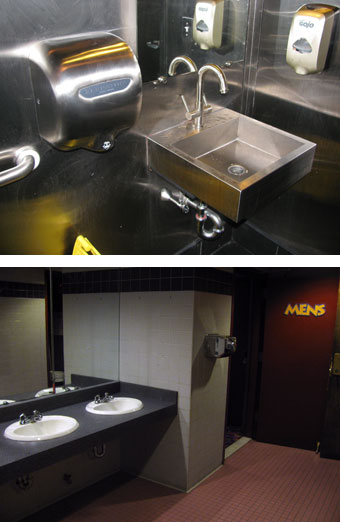In hand dryers vs. disease, disease is winning

Davis Square, Somerville, coffee shop Diesel opted for Xlerator hand dryers over paper towel in its restrooms, while Entertainment Cinemas in Cambridge's Fresh Pond relies on a slower, less effective kind of blower. (Photos: Marc Levy)
It’s cool that businesses want to save money and the environment by cutting out paper towels in their restrooms, but a little less cool when the result is a global pandemic.
The connection, of course, is that washing your hands makes you 24 percent less likely to get a respiratory illness such as a cold or bacterial pneumonia, according to the World Health Organization, and half as likely to catch intestinal viruses, but most of the hot-air hand dryers that have replaced paper towels not only blow, but suck. They’re a disincentive to disinfecting and a free ride for diseases such as SARS, West Nile Virus, avian flu and the H1N1 flu virus, which as of Friday had killed 1,000 and hospitalized 20,000 in the United States.
A good example of a bad situation is at Entertainment Cinemas in Fresh Pond, where a single feeble men’s room hand dryer is meant to handle crowds of people, including many of those fastidious teens, even during peak weekend filmgoing hours. This is one of the pathetic dryers we’re most familiar with: The ones that exhale asthmatically for up to 40 seconds while we rub our hands vigorously underneath to no effect (unless you count feeling damp, clammy and foolish).
So at Entertainment Cinemas and countless other businesses, people emerge from stalls, do the calculation of how long it will take them to wash and dry, and walk out without bothering. (Or they may do that thing where they run cold water over the hands for about half a second and walk out, wiping on their pants, which means they’re missing the point and, you know, killing us all.)
Somewhere out there are Xlerator hand dryers, which have all sorts of corrective boasts to the lousy reputation of their predecessors and lower-end competitors: that they use 80 percent less energy than the most common models, represent a 95 percent cost savings versus paper towels and dry hands completely in 10 to 15 seconds, compared with the usual discouraging 22 to 40. There are a few around; when Diesel renovated its restrooms this summer, it made the move to the Xlerator.
On the higher and even faster end, the Dyson Airblade claims to use 80 percent less energy and promises dry hands in a solid 12 seconds. And the Mitsubishi Jet Towel, ubiquitous in Japan, boasts of a drying time of a mere 5 to 6 seconds.
This isn’t a cure-all, though.
The Jet Towel came to the United States in 2005, but is expensive and has a still “very small” market share, according to Asher Bailey, of the Seattle-based reseller Pacarc LLC. Hand-washing aficionados will be hard pressed to find a Jet Towel in Boston, although there are a few slightly-less-expensive Airblades around — meaning about $1,400 each instead of $1,500 each; Xlerators are less than $500 — terrifying kids at the Museum of Science, for instance, and pleasing select travelers at Logan International Airport.
(In truth, “the differences in drying time are negligible,” Bailey admits, with the Jet Towel and Airblade really drying to U.S. standards at 8 to 10 seconds. Drying time is shorter in Japan because, really, the Japanese are happier with slightly damper hands, he says.)
Industry estimates have the old, inefficient hand dryer models on the road to extinction in five years, largely replaced by Xlerator-type dryers in public places. Higher-end models such as the Jet Towel would go in private offices or upscale settings where the roar of an Xlerator would be unwelcome.
It’s good hand-washing technology is evolving, but it doesn’t matter if businesses don’t take advantage or take other steps toward cleanliness in the meantime. The microscopic beasties, unfortunately, are evolving much faster.
Some content from this article appeared previously in The Herald of New Britain, Conn., and The Bristol (Conn.) Press.

